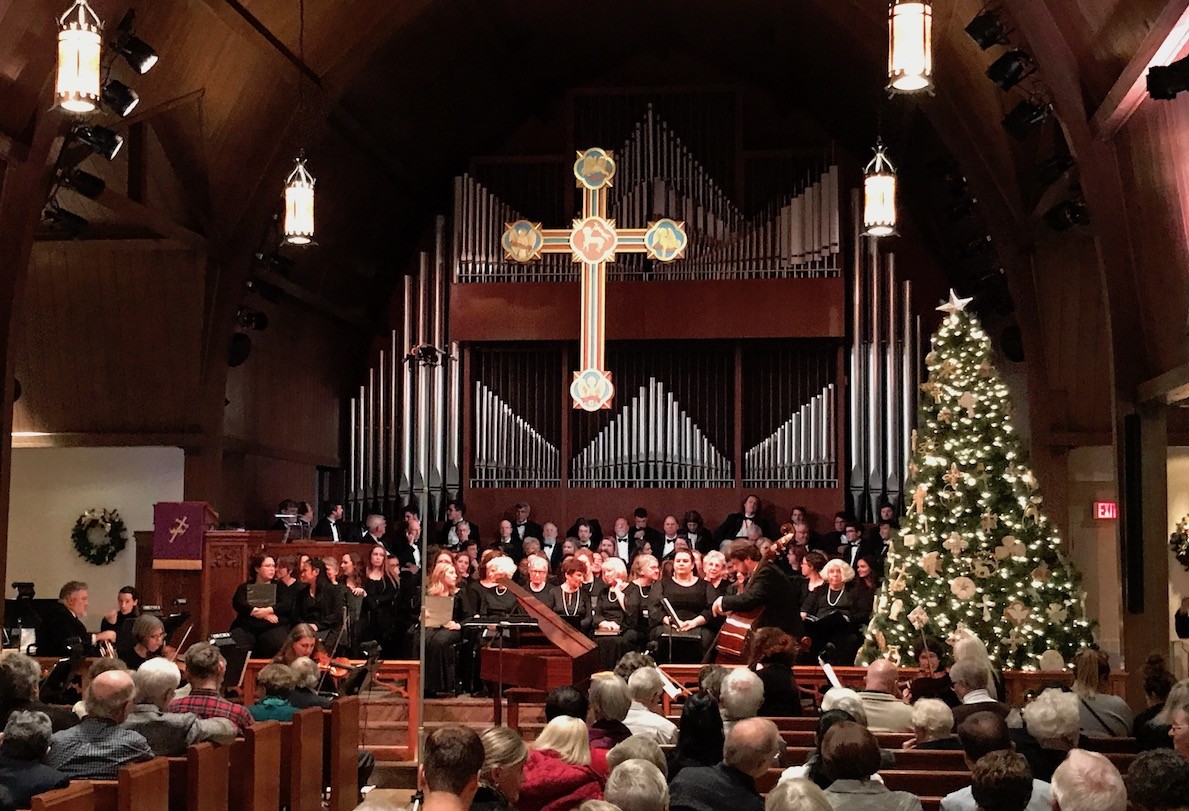The first impression when Dr. Jaclyn Johnson took the podium at First United Methodist Church in Oak Ridge Friday night, for Oak Ridge Civic Music Association’s Christmas choral concert, was that she had recolored her gorgeous blond hair to match the bluish silver of the lead-alloy pipes of First Methodist’s magnificent Moeller organ, installed in 1984.
Instead, it was just a festive concert gesture by Johnson, director of the Oak Ridge Chorus and assistant director of choral activities at the University of Tennessee School of Music.

Dr. Jaclyn Johnson
The peaked-barrel vault of First Methodist’s sanctuary, renovated to accommodate the Moeller organ, which was reconditioned and expanded to 49 ranks in 2007, has wonderful acoustics for both organ and choral singing.
Just as she had promised in her publicity statements about the concert, Johnson’s forces, which included the University of Tennessee Concert Choir and members of the Oak Ridge Symphony, filled every crevice with glorious sound.
The diction was crisp. Terminal consonants were precise, without any hissing Ss or thudding Ds, or, worst of all, disappearing.
The opening work, Ralph Vaughan Williams’ “Fantasia on Christmas Carols” was a joy to hear, especially the solo passages sung by bass-baritone Daniel Johnson-Webb, whose voice is robust and resonant.
David Ensley’s arrangements for “Here We Come a-Caroling: A Festive Sing-a-long,” during which the sold-out audience was invited to join in and enthusiastically did, was made up of recognizable religious and secular Christmas carols, along with a Hanukkah carol about a clay dreidel, a four-sided spinning top that’s a favorite during the Jewish holiday celebrations.
Then came Part I of Georg Frideric Handel’s “Messiah, written in 1742 and a favorite in the English-speaking world in the 275 years since.
With the orchestra taking a larger role, the instrumental ensemble’s lack of rehearsal time became more evident during the opening “Sinfony.” The playing was certainly competent, but not always clean and precise. The tempo was also slower than it appeared that Johnson would have liked, probably due to the strings not being prepared for all of Handel’s rush of notes.
Nevertheless, its alternating sections of soloist and choral passages were delightful to hear, notably the four soloists, whose vocal strengths, tone and timber were well matched.
“Comfort ye, comfort ye, my people,” the first vocal section, was sung by tenor Seth O’Kegley, the director of music at First Methodist.
After the choral passage about “the glory of the Lord,” bass-baritone Johnson-Webb sang “Thus saith the Lord.” An Oklahoma native, Johnson-Webb is earning certification to teach in the local schools.
Next, “But who may abide” was sung by alto Caitlin Bolden, who teaches at Carson-Newman University and Pellissippi State Community College.
There were more alternating passages among the chorus, Johnson-Webb and Bolden before an orchestral interlude, after which soprano Haley Retterer sang “There were shepherds abiding in the fields.”
Bolden was a last-minute replacement for Roxanne Cabrera. All four of the soloists hold master’s in vocal performance degrees from the University of Tennessee School of Music, a testament to the quality of the school’s vocal program.
The concert ended with the “Hallelujah” chorus, which comes at the conclusion of Part II in Handel’s oratorio.
The audience rose quickly to their feet, in accordance with the long tradition of respect paid to this celebratory moment in the music.

